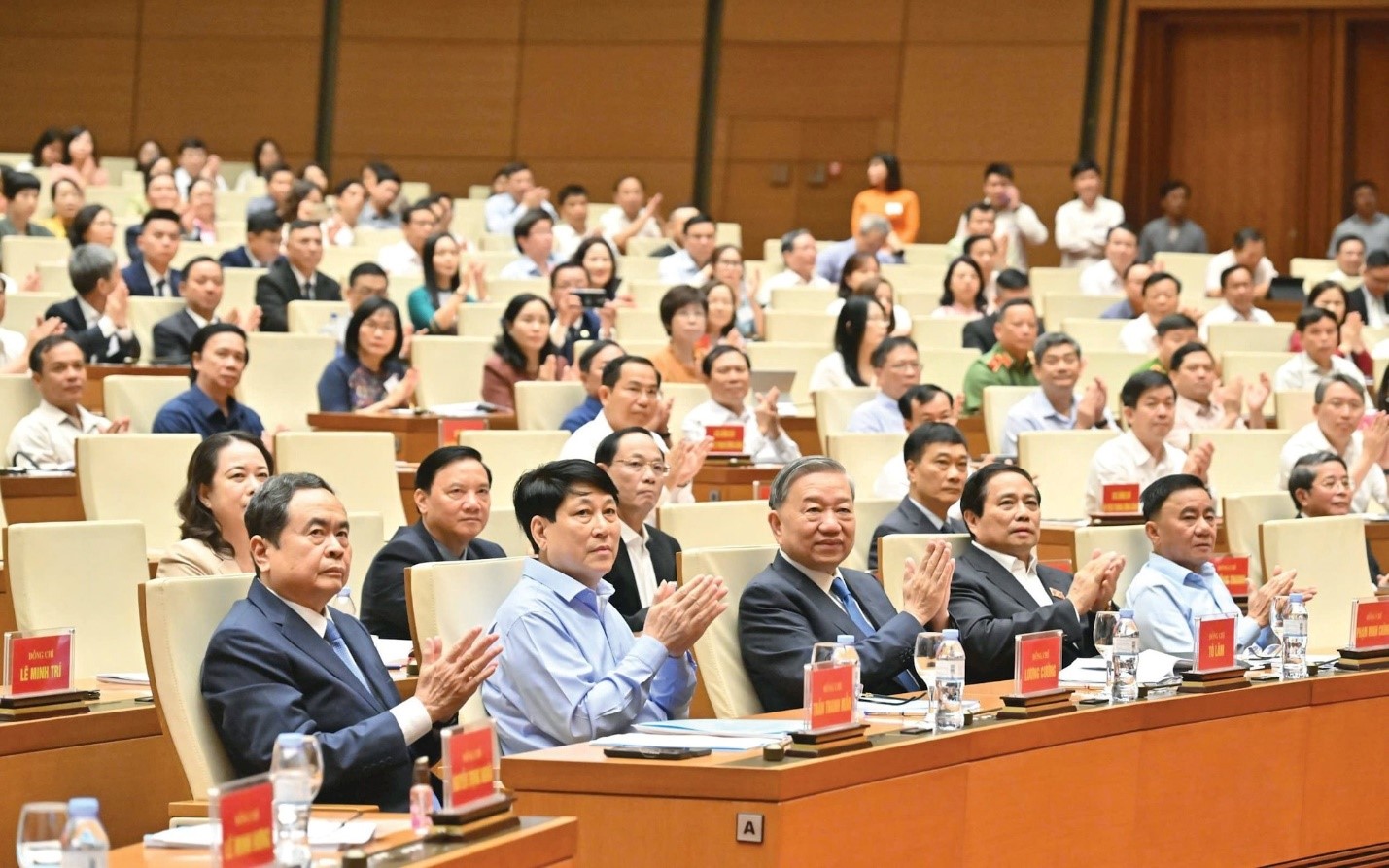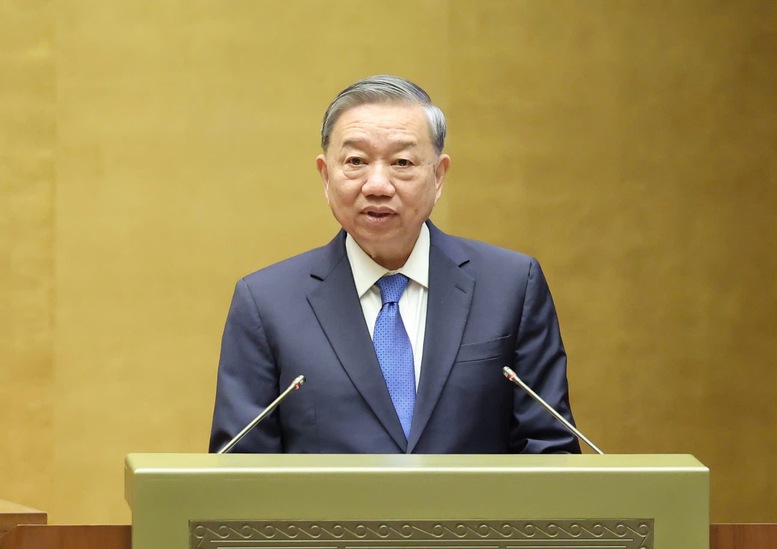Private economy – the most important driving force
The General Secretary affirmed that Resolution 68 marks a strong shift in development thinking by identifying the private economy as one of the most important driving forces of the national economy. From a "supplementary" role, this sector has now become a parallel pillar alongside the state and collective economies.
The Resolution outlines specific solutions such as: perfecting institutions to protect property rights and freedom of business; unblocking resources in land, credit, and technology; developing an entrepreneurial ecosystem, supporting private enterprises to participate in global value chains; and building a modern team of entrepreneurs with political acumen and professional ethics.
The Resolution asserts that Vietnamese entrepreneurs are "soldiers on the economic front" in the new era, laying the foundation for a comprehensive transformation in private economic development policy, shifting from "recognition" to "protection, encouragement, and promotion," and from a "supplementary" role to "leading development."
"On the economic front, everyone must labor to create material wealth for society; everyone has the right to pursue a prosperous, happy life and contribute to social development; everyone has the right and conditions to demonstrate aspirations for dedication and creative innovation," the General Secretary said, emphasizing: "The Party and the State are responsible for ensuring that all citizens can exercise their fundamental human and social rights."

Delegates attend the National Conference to thoroughly grasp and implement Resolutions No. 66 and No. 68 of the Politburo. Photo: VGP
Science, technology, and innovation – a crucial foundation
On the occasion of Viet Nam Science and Technology Day (May 18th), the General Secretary extended his congratulations to the scientific community and emphasized the strategic role of Resolution 57. According to him, science, technology, and innovation should not merely be supporting tools but must become the primary driving force for national modernization. He called for: Eliminating outdated, formalistic thinking; creating a favorable environment for creativity, research, and technology application; and perfecting institutions to transform science and technology into a national competitive advantage.
Institutional reform – the foundation for development in the new era
Resolution 66 identifies innovation in law-making and enforcement as a vital factor. Laws not only regulate behavior but also serve as instruments to organize state power, ensure human rights, and promote development. The three major focuses are: Perfecting institutions in key areas such as streamlining and effective state apparatus; developing a socialist-oriented market economy; protecting human rights; and building a healthy, competitive business investment environment. Innovating the law-making process towards proactivity, constructiveness, ensuring laws are unified, synchronous, specific, easy to understand, and easy to implement. Enhancing the effectiveness of law enforcement, strengthening discipline and order in implementation, and linking power with accountability.
The General Secretary emphasized: "Resolution 66 is truly a rallying call for a profound institutional reform, aiming to build a modern, substantive legal system that serves the people, while creating sustainable momentum for building a prosperous, democratic, equitable, and civilized Viet Nam in the 21st century."
International integration – a strategic driving force
Resolution 59, promulgated amidst global fluctuations, identifies international integration as a strategic driving force, demanding innovative thinking and decisive action. Its major orientations include: Developing the digital, green, and circular economy; enhancing competitiveness through science and technology; and building a cadre of integrated officials with strong capabilities and high professional expertise.
The General Secretary clearly stated: "International integration in the new situation requires us to be more proactive, more decisive, more creative, based on steadfast independence and self-reliance, while being flexible and responsive in foreign policy strategies and tactics, maximizing opportunities, overcoming challenges to develop the country rapidly and sustainably. Resolution 59 can be seen as a compass for action for our entire Party, military, and people in the new era of international integration. Every Party Committee, Party organization, official, and Party member must thoroughly grasp the spirit of the Resolution, concretize it into practical action programs and plans; and at the same time, maximize the spirit of responsibility, innovate thinking, break through in action, and be determined to make international integration a powerful driving force for Viet Nam to reach higher and further on the international stage."

General Secretary To Lam Delivers Speech Emphasizing the Spirit of Politburo Resolutions. Photo: VGP
New development mindset – synchronized actions
The General Secretary emphasized that the breakthrough point of the "quartet of resolutions" lies in a new development mindset: Shifting from "management" to "service," from "protection" to "creative competition," and from "passive integration" to "proactive integration." He directed four key tasks for the next five years: First, perfecting a modern legal system; second, making breakthroughs in science, technology, and digital transformation; third, strengthening international integration; and fourth, vigorously developing the private economy.
Alongside these are eight urgent tasks for 2025, including: Finalizing action programs to implement the four resolutions, with clear objectives, roadmaps, and assignments; establishing a set of indicators for periodic monitoring and evaluation. Reviewing and amending laws in line with the spirit of Resolution 66, prioritizing regulations on property rights, freedom of business, innovation, and integration; researching and promulgating a Law on Private Economic Development. Launching key programs on science and technology, innovation, and digital transformation; building an innovation hub and a legal framework for sandbox models. Promoting international integration, effectively implementing existing FTAs and negotiating an FTA with the United States; preparing to join DEPA, IPEF; leveraging integration commitments to drive growth. Improving the business investment environment: cutting administrative procedures by 30%, digitizing public services, supporting small and medium-sized enterprises; developing a project for the growth of large private corporations. Consolidating the resolution implementation apparatus, establishing specialized steering committees at all levels, ensuring a unified command mechanism and regular oversight. Training high-quality human resources, focusing on modern law, science and technology, integration, and corporate governance; developing a team of young cadres with innovative thinking and digital capabilities. Enhancing communication and policy dialogue, building national communication programs for each resolution; mobilizing social intellect, creating consensus in implementation.
Confidence in a developed future
The General Secretary affirmed: "We have every reason to believe in a bright future for the country. With a heroic tradition, intelligence, and a strong aspiration to advance, Viet Nam will continue to make steady progress on the path of rapid and sustainable development." He also issued a rallying call: "Let us together ignite the flame of 'Innovation – Aspiration – Action,' for a prosperous, flourishing, strong Viet Nam, standing shoulder to shoulder with major powers across five continents by 2045."